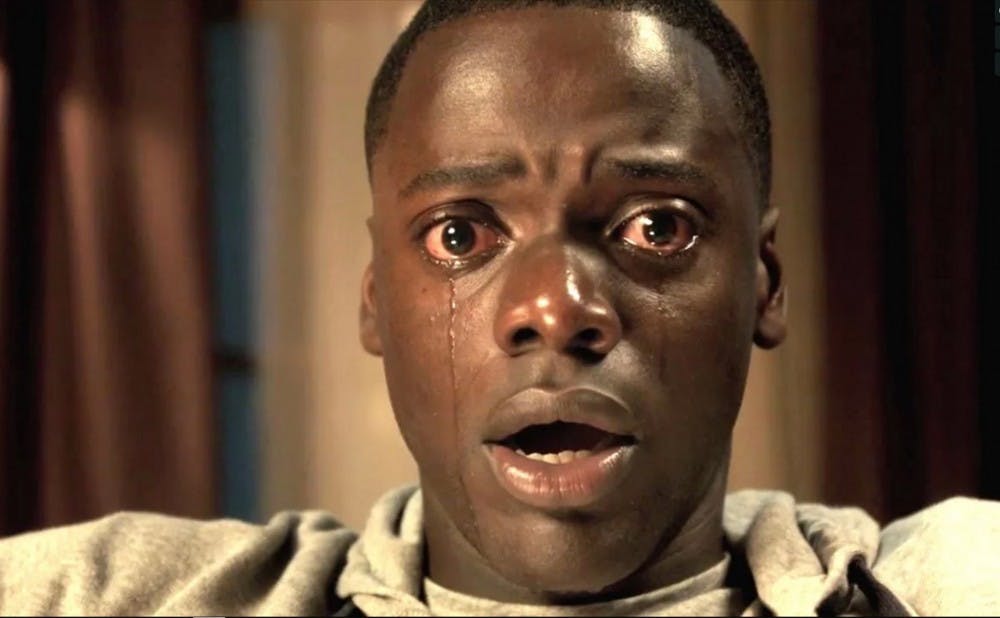Dusk has fallen over an affluent neighborhood and the manicured lawns and pristine architecture are barely visible in the dim illumination of a few street lights. A young black man walks along the suburban sidewalk in supposed solitude, mumbling house numbers and street names in an attempt to discern his surroundings. Nimble camerawork and the innate tension of such a scene alert us that the figure is not truly alone, and our fears are quickly confirmed as a suspicious car slinks alongside the man like a predator deftly hunting its prey.
The man quickens his pace in fright and we are struck with the familiarity of the situation. It’s horror movie trope played out a million times before, that’s for sure—think of Michael Myers stalking his victims in “Halloween”—but it’s also alarmingly similar to the circumstances that led to the death of Trayvon Martin, a black 17-year-old killed for being black in a rich, white neighborhood. It’s in this opening scene of “Get Out” that writer and director Jordan Peele illustrates to us the two-fold nature of his film: it is both a loving homage to the horror classics that preceded it and a biting commentary on American racial politics.
After its harrowing prologue, “Get Out” finds its focus on Chris (played by Daniel Kaluuya), a talented black photographer, as he prepares to accompany his girlfriend Rose (Allison Williams) on a trip to her parents’ house in the country. Chris is visibly nervous–he frets over his suitcase and pointedly asks Rose, “Do they know I’m black?” She tells him that they don’t know, but insists that it’s okay because her parents are bona fide liberals who would’ve voted for Obama a third time if they could’ve. (Because white convention leads us to belief that voting for Obama absolves you of all aspects of racism.) The uncertainty of the trip and Chris’s reception is palpable.
But, for the most part, everything is amiable when the couple arrives at the home of Rose’s parents, Dean (Bradley Whitford) and Missy (Catherine Keener). The scenario is comparable to that of “Guess Who’s Coming to Dinner,” but without the overt hostility and racial tension. Sure, Rose’s parents are a little awkward and cringe-worthy when conversing with their daughter’s boyfriend—Dean calls Chris “my man” with a forced affectation and proudly brags that his father lost a spot in the Olympics to the black athlete Jesse Owens—but they aren’t chasing Chris off the lawn, wielding shotguns and spouting racial epithets.
Still, though, Chris is somewhat uneasy. The groundskeeper and maid (played by Marcus Henderson and Betty Gabriel) are both black, and their behavior is forced and eerie, disengaged from reality like robots with their wires pulled too taut. At the family’s annual gathering of friends, Peele lays the racial microaggressions bare—the upper-class whites divulge to Chris their love of Tiger Woods, ask him what he perceives the African-American experience to be and grope his muscles without his permission. The inexplicably bizarre and racially-charged encounters pile up and Chris is left puzzling over whether the white folks are just off-kilter or if something more insidious is taking place.
Peele, a quick-witted comedian by trade, elegantly weaves the conventions of horror and comedy together in a manner that’s both smart and effective in conveying his cinematic and racial commentary. He’s clearly aware of the more over-done aspects of the horror genre—more often than not, viewers grow frustrated and disengaged with a protagonist who willingly places himself in peril’s way. In “Get Out,” Peele builds the tension of the film in a deliberately slow manner, allowing the viewer to sympathize with Chris’s continued involvement in the family’s strange affairs. And while Peele’s indictment of the white liberal elite may seem overt at times, it’s not far from the truth—claims of a ‘post-racial America’ were vehemently present during Obama’s tenure.
At its core, “Get Out” is a surprisingly strong debut from Peele. The film’s direction, pacing and script are all indicative of a filmmaker who’s been creating cinematic masterpieces for quite some time, not a newcomer to the craft. The horrific moments blossom onscreen in a timely manner and the twist is revealed in handfuls, the viewer left to string the narrative together with previously dispatched clues. Likewise, Peele turns Chris into a singular and well-developed character, but he never allows the protagonist to lose his universality. In particular, when a police car comes across Chris in a bloodied and vulnerable state at the close of the film, our automatic reaction isn’t elation at the prospect that he’s been rescued—instead, we are terrified, praying that the officer isn’t white and won’t fatally shoot him on the spot.
Indeed, “Get Out” isn’t subtle about confronting the racial issues currently present in America. Peele doesn’t water down the racial aggressions voiced by his characters and doesn’t provide a morally-sound white person to rally around. He channels real, overt fears into a wickedly funny and terrifying horror flick, guaranteeing that racist attitudes and the subjugation of black bodies are scarier than any masked killers or flesh-eating monsters will ever be.
Get The Chronicle straight to your inbox
Signup for our weekly newsletter. Cancel at any time.

